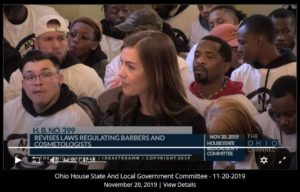Rep. Powell Sponsor Testimony: Cosmetology Reform Act
Rep. Powell Sponsor Testimony: Cosmetology Reform Act
Below is sponsor testimony given to the House State and Local Government Committee
Chairman Wiggam, Vice Chair Stephens, Ranking Member Kelly, and members of the House State and Local Government Committee, thank you for the opportunity to present sponsor testimony on HB 399.
The Cosmetology Reform Act will comprehensively reform Ohio’s occupational licensures as well as cosmetology and barber laws, and seeks to make Ohio the national model in this area.
This bill seeks to: (1) focus on cosmetology student success in entering the beauty industry with less debt and greater ability to repay student loans; (2) facilitate a continuous workforce development pipeline for salons; (3) reduce the amount of unnecessary regulations placed on members of the cosmetology industry, and make it easier for Ohioans to begin or expand their business in the state. From small business owners to aspiring cosmetologists, mostly women and minorities, this legislation would remove significant barriers to success.
This legislation is written to accomplish the following goals:
- License mobility/reciprocity – Ohio is open for business. The license reciprocity language creates license mobility and facilitates movement between different states for a more mobile workforce. It strives to minimize the tendency of stylists to drop out of the industry or go underground due to a lengthy license transfer process, and enables multi-state employers to relocate employees, increasing their career opportunities. Three states, Arizona, Montana, and Pennsylvania, recently passed legislation to remove barriers to work for all active licensees from other states to begin working within days, not months when moving into those states.
- Allows on-demand scheduling and working outside a salon – Several beauty industry licensees need to provide on-site cosmetology services for weddings, films and special occasions around the state outside of a bricks and mortar salon. Our legislation ensures that the Ohio State Cosmetology and Barber Board (OSCBB) can ensure such services can be performed on-site and with reasonable requirements for licensees to ensure public safety.
- Lowers state mandated licensure hour requirements. Lower the Ohio requirement for cosmetology licensure hours from 1,500 to 1,000; reduce hair designer licensure hours from 1,200 to 800; and reduces barber hours from 1,800 to 1,000. Independent research and successful models in New York, Massachusetts, and now Vermont and Texas, show there is no justification for requiring more than 1,000 hours of education for cosmetology or barber licensure.
- Provides Licensees with 1,500 hours of training an Intermediate License – This change ensures that all licensees that have completed 1,500 by the effective date of this bill will receive an intermediate license. It also provides public and private schools the opportunity to establish a higher level of training for future licensees as an elective course without being state required hours.
- Creates a cosmetology apprentice process for licensure – Several private schools of cosmetology have closed their doors in the last 4 years. This is leading to significant concern for small salons across the state to ensure a steady stream of new licensees are becoming licensed in Ohio. The apprenticeship program in our bill is modeled after more than 20 states, like Wisconsin, Tennessee and Alabama. This program will provide salon owners the opportunity to become a provider and future cosmetology licensees the ability to work and earn a wage while working toward licensure rather than taking on student loan debt.
- Sets schools of cosmetology up for success and consistency across state lines – One area focuses on requiring pre-graduate testing for public and private school students. Two states, Arizona and Illinois, recently enacted such changes. This change not only gives students the opportunity to get remedial training if they fail, but allows graduates to be licensed immediately upon graduation, moving into the workforce sooner to earn wages, pay taxes, and begin repaying loans. In addition, the bill authorizes distance learning to provide maximum flexibility for students to learn when and where convenient and lowers the cost for schools traditional on-site, bricks and mortar classrooms.
As most of you have heard me say, I am on a mission to make Ohio the most business-friendly state in the nation. One of the biggest steps we can take in that direction is to stop overregulating individuals in our state. It is time we move forward to make Ohio a more attractive place for individuals to live, work, play, and raise families in our communities.
Thank you again for the opportunity to present HB 399, the Cosmetology Reform Act, and I am happy to answer any questions from the Committee at this time.


Leave a Reply
Want to join the discussion?Feel free to contribute!